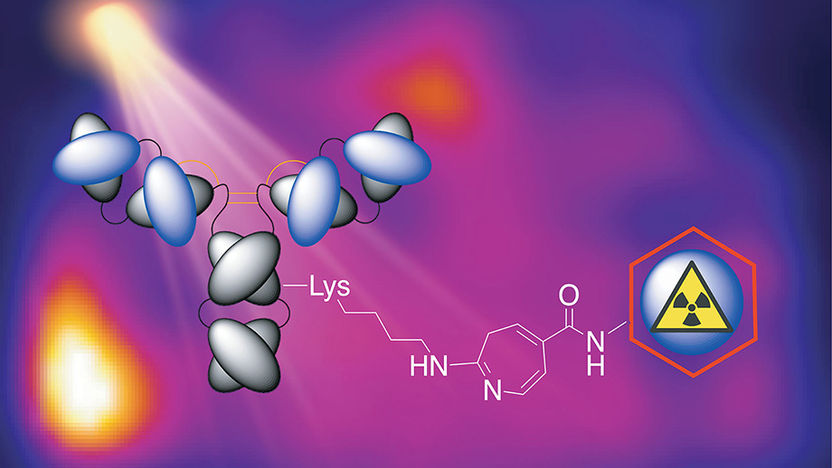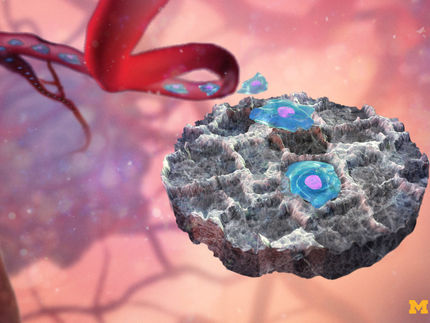Simple and Fast Method for Radiolabelling Antibodies against Breast Cancer
Using UV light, radiolabelled antibodies can be produced in just 15 minutes
Radioactive antibodies that target cancer cells are used for medical diagnostics with PET imaging or for targeted radioimmunotherapy. Researchers from the University of Zurich have created a new method for radiolabelling antibodies using UV light. In less than 15 minutes, the proteins are ready-to-use for cancer imaging or therapy.

Using UV light, radiolabelled antibodies can be produced in just 15 minutes.
Jason P. Holland, UZH
Radioactive antibodies are used in nuclear medicine as imaging agents for positron emission tomography (PET) – an imaging technique that improves cancer diagnosis and monitoring of chemotherapy. Radioactive drugs can also be designed to kill tumors by delivering a radioactive payload specifically to the cancer cells. This treatment is called targeted radioimmunotherapy.
Photoradiolabelling: Radiochemistry in a flash
Conventional methods for radiolabelling proteins are time-consuming and difficult to automate. They require multi-step procedures in which the protein is purified, coupled to a metal-binding chemical substance, isolated, stored, and then radiolabelled. The team of Jason P. Holland, professor in the Department of Chemistry at the University of Zurich (UZH), has now established a new innovative method using UV light to synthesize radioactive drugs and diagnostic agents. “By combining photochemistry with radiochemistry, we are now able to make radiolabelled proteins much more quickly and easily – literally in a flash of light,” Holland says.
Metal-ion-binding and photoactivatable molecules
The UZH researchers produced a series of novel chemical compounds called chelates that have two distinctive properties: First, they are able to bind radioactive metal ions like gallium, copper and zirconium. Second, the molecules have a special chemical group that becomes activated by shining UV light on the sample. “The UV light causes the small metal complex to react extremely quickly and efficiently with certain amino acids found in proteins like antibodies,” Holland adds.
One-pot process in less than 20 minutes
The team was able to establish a one-pot process to radiolabel trastuzumab, an antibody used to treat patients with breast cancer, with gallium in less than 20 minutes. Remarkably, the photochemical conjugation was also successful using the prepared drug that is injected into the patient without pre-purification of the antibody. “The efficient one-pot route simplifies the production of radiolabelled proteins. It has the unique advantage of avoiding the need to isolate and characterize the conjugated intermediate antibody. And the process can be fully automated,” Holland stresses.
Radiolabelled antibodies for PET imaging
Time is one of the main challenges in radiotracer design for PET imaging. Since gallium, which is used frequently in nuclear medicine, decays rapidly, Holland’s team further developed their method using zirconium to radiolabel trastuzumab. They managed to synthesize the radiolabelled breast cancer antibody in high yield and purity in less than 15 minutes. With mice bearing human cancer cells that are targeted by trastuzumab, they showed that for PET imaging the zirconium-labelled antibody worked as well as those produced via established methods.
Patent application submitted
“Automated photoradiochemical synthesis has the potential to revolutionize the way in which radiolabelled antibodies and other proteins are used in science and medicine,” Jason P. Holland says. Therefore, he has submitted a patent application for the new procedure and aims to develop the technology along commercial lines. Furthermore, the researchers are expanding the technology for use against other cancers.
Original publication
Malay Patra, Larissa S. Eichenberger, Gregor Fischer, and Jason P. Holland; "Photochemical conjugation and one-pot radiolabelling of antibodies for immuno-PET"; Angew. Chem.; December 5, 2018.
Larissa S. Eichenberger, Malay Patra and Jason P. Holland; "Photoactive chelates for radiolabelling proteins"; Chem. Commun.; December 21, 2018.
Malay Patra, Simon Klingler, Larissa S. Eichenberger and Jason P. Holland; "Simultaneous photoradiochemical labelling of antibodies for immuno-PET"; iScience (Cell Press); March 7, 2019.
See the theme worlds for related content
Topic world Antibodies
Antibodies are specialized molecules of our immune system that can specifically recognize and neutralize pathogens or foreign substances. Antibody research in biotech and pharma has recognized this natural defense potential and is working intensively to make it therapeutically useful. From monoclonal antibodies used against cancer or autoimmune diseases to antibody-drug conjugates that specifically transport drugs to disease cells - the possibilities are enormous

Topic world Antibodies
Antibodies are specialized molecules of our immune system that can specifically recognize and neutralize pathogens or foreign substances. Antibody research in biotech and pharma has recognized this natural defense potential and is working intensively to make it therapeutically useful. From monoclonal antibodies used against cancer or autoimmune diseases to antibody-drug conjugates that specifically transport drugs to disease cells - the possibilities are enormous
























































